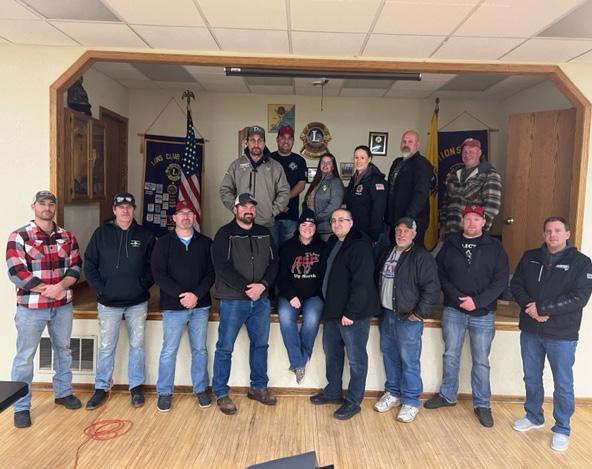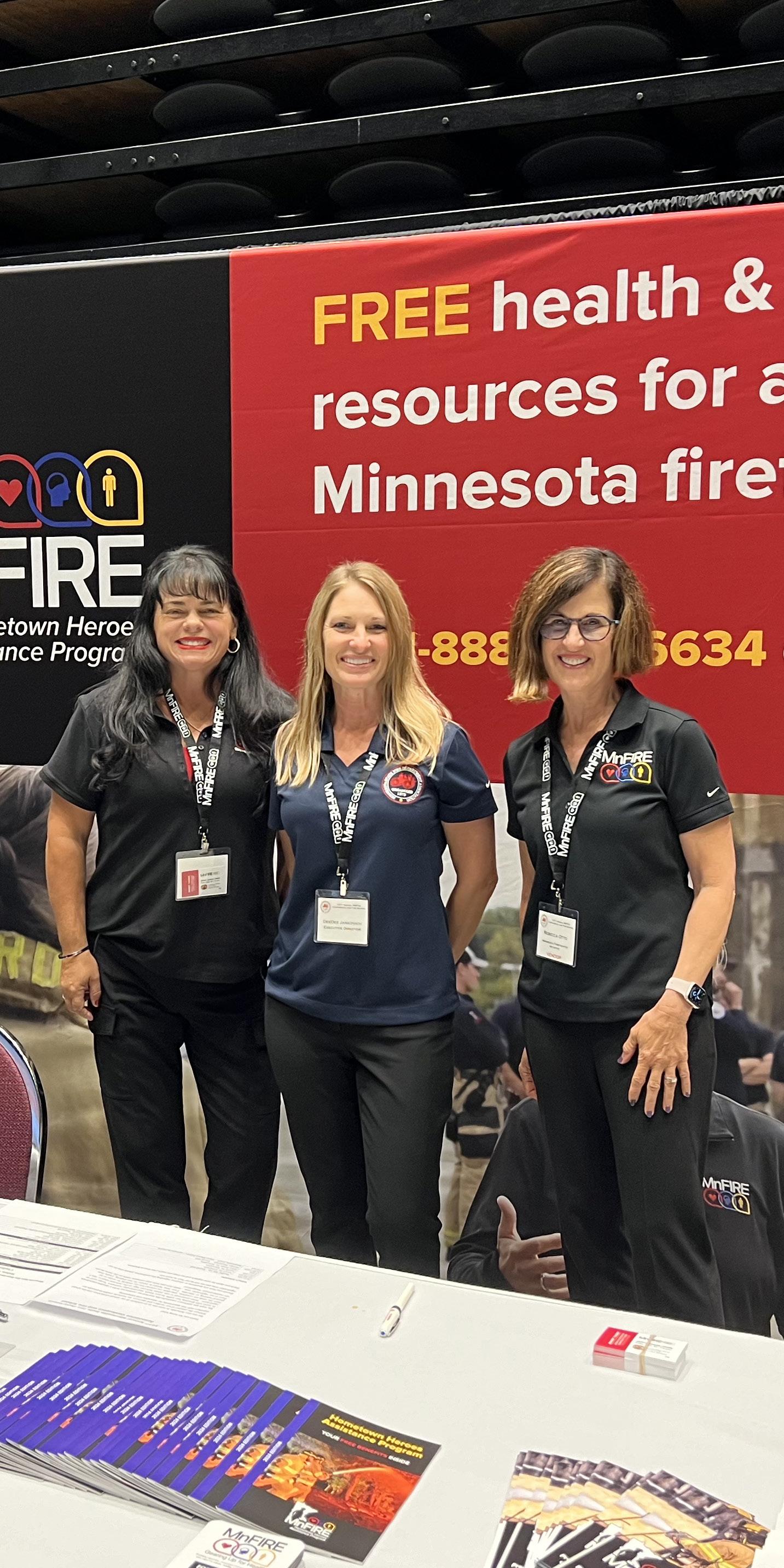

MnFIRE Board of Directors
George Esbensen, President
Retired Fire Chief, Eden Prairie Fire Department
Mike Dobesh, Vice President Fire Chief, Richfield Fire Department
John Wolff, Treasurer
Retired Deputy Fire Chief, St. Louis Park Fire Department
Ken Bence, Secretary
Battalion Chief, Golden Valley Fire Department
Amber Lage
Deputy Chief of EMS, Minneapolis Fire Department
Ed Hoffman Fire Chief, Owatonna Fire Department
Scott Vadnais Lieutenant, Edina Fire Department
MnFIRE Staff
Rebecca Otto
Executive Director
DeeDee Jankovich
Director of Program Delivery

From the Executive Director

MnFIRE’s work supporting Minnesota firefighter physical and emotional health is still going strong. We know that our efforts are making a difference for firefighters across the state. Many have said, “You will never know how much you all have helped me.” Those messages inspire our work every day.
In terms of change, MnFIRE is entering 2025 after a year of growth. In late May 2024, I was asked to join MnFIRE as the Director of Business Affairs. I bring nonprofit, small business and government experience to the table, including 12 years as the State Auditor providing financial and legal compliance oversight for all local governments in Minnesota. During my time as State Auditor, I convened the Volunteer Fire Relief Association Working Group. There, we overhauled Minnesota statutes to make them work for all reliefs regardless of location in the state. The relief associations pay service pensions to our volunteer firefighters, and my office oversaw them. It was a thrill each year to work to improve outdated statutes collaboratively with fire service leaders across the state. Our bills always were passed by the legislature and signed by the sitting governor.
On August 1, Wayne Kewitsch retired and I took the helm as MnFIRE’s Executive Director. Since joining MnFIRE, we have been able to undertake projects that are building our organizational capacity; we went from contract employees to in-house employees, we updated our policies and procedures, adopted employee position descriptions, an employee evaluation and payroll policy, and changed our procurement process to align with state grant requirements. All great developments – and we are not done!
MnFIRE administers the Hometown Heroes Assistance Program (HHAP), which is funded with an annual $4 million appropriation from the state through the Department of Public Safety (DPS). We are thankful for our new DPS grants manager, who has made the grants process smooth and understandable. MnFIRE can stay focused on providing services through the HHAP that support firefighter physical and emotional health, including proactive health and wellness trainings to fire departments, a Critical Illness insurance policy, and the MnFIRE Assistance Program, which includes mental health visits and a peer support program.
It has become very clear that the HHAP is a critical resource for our fire service community. Over 90% of our fire service in Minnesota is volunteer, so the HHAP fills in the holes that existed before the law was passed. We are honored to provide this programming for our firefighters, who tend to have occupational health challenges due to the nature of their work.
We look forward to a new year filled with promise and opportunities to better support our fire service in Minnesota.
Thank you for your support of MnFIRE’s work!

Rebecca Otto MnFIRE Executive Director
No-cost Benefits for Minnesota’s Fire Service
Minnesota firefighters work tirelessly to keep our communities safe, but they’re significantly affected by serious health conditions including cardiac disease, emotional trauma and cancer at rates higher than the general public. And because more than 90% of Minnesota’s fire service is volunteer or non-career, many firefighters don’t have access to health and wellness benefits through their department. But there is hope thanks to the Hometown Heroes Assistance Program.
This program ensures every Minnesota firefighter has access to the resources needed to better their health and wellness, and support for a cardiac, emotional trauma or cancer diagnosis. This program is administered by MnFIRE and funded through the $4 million Hometown Heroes Assistance Program grant from the State of Minnesota.

Scan the QR code for the HHAP Benefits Guide
Active volunteer, paid-on-call, part-time and full-time firefighters across Minnesota are utilizing the following no-cost benefits:

Critical Illness Program
A Critical Illness insurance policy which covers diagnoses of critical illnesses such as a heart attack, cancer or posttraumatic stress injury (PTSI), and provides a lump-sum cash payment up to $20,000 per diagnosis to assist with expenses.

MnFIRE Assistance Program
Confidential help and mental health resources available 24/7. This program provides up to five free counseling visits per issue per year for firefighters and their families with mental health professionals who have been trained to address the unique experiences of the fire service, as well as peer support from trained and trusted peers.

MnFIRE Training
Annual health and wellness training provided at no cost to fire departments on cancer, cardiac health, emotional wellness, sleep, fitness, nutrition and more topics so firefighters can learn about increased occupational health risks and helpful strategies for staying healthy and safe.

196 CLAIMS PAID IN 2024
Critical Illness Program

$1,911,000
TOTAL PAID IN 2024
MOST FREQUENTLY COVERED CONDITIONS IN 2024:
1. Post-Traumatic Stress Injury
2. Full Benefit Cancer
1. Heart Attack
“When I was diagnosed with stage 3 prostate cancer nearly two years ago, I could not have imagined all the doctor’s appointments and tests I was going to have to go through. The help I received from MnFIRE’s Critical Illness Program was such a benefit and relief to have available. It made life a lot less stressful, knowing that I didn’t have to worry about some of the major expenses that arise when you can’t work, can’t take care of yourself ... And it was a very simple process to apply for the benefit.”
— MINNESOTA FIREFIGHTER
“There was a real peace of mind knowing that financially I didn’t have a concern. I could focus on my health. I could focus on my family.”
— CHIEF KIP SPRINGER ROSEMOUNT FIRE DEPARTMENT

Scan the QR code to read more about Chief Springer’s unexpected diagnosis and what he wishes every firefighter knew.

MnFIRE Assistance Program
1,193
MENTAL HEALTH CARE PROVIDERS IN 2024 17% FROM 2023
1,205 COUNSELING VISITS IN 2024 5% FROM 2023
Peer Support
Firefighters of all ranks and backgrounds and their family members regularly rely on MnFIRE’s trained Peer Support network. 129 CALLS IN 2024
“I started immediately unpacking some of the trauma. It was explained to me that it’s just like a physical injury – how your brain takes days to even process what we see before we can even make sense of it. It really opened my eyes.”
— JEFF ROSENER MINNEAPOLIS FIRE DEPARTMENT

Scan the QR code to read more about Jeff Rosener’s lifechanging experience with Eye Movement Desensitization and Reprocessing (EMDR) therapy.

MnFIRE Honored by NAMI Minnesota for “Transforming Attitudes”

MnFIRE was presented with the Transforming Attitudes Award by National Alliance on Mental Illness (NAMI) Minnesota at their 2024 annual conference. This award recognizes an individual or organization that has promoted justice, dignity and respect, and has worked to transform attitudes toward people with mental illnesses. MnFIRE is proud of the work we’ve done to fill a critical need in the Minnesota fire service for emotional wellness training, peer support and access to mental health providers – and to positively change attitudes of firefighters around seeking mental health help.

“While all struggles may not be the same, many of our fears, anxieties and stressors are. I think people often feel they are the only ones experiencing something, so they keep it to themselves out of fear of being judged. When in reality, we all have more in common than not.”
“Firefighters are there for traumatic events but have often suffered in silence, leading to higher rates of depression, substance use, PTSD and suicide. The Minnesota Firefighter Initiative works to change attitudes towards treatment among firefighters and provides resources, especially to the many volunteer firefighters across our state. And they are succeeding!”
— SUE ABDERHOLDEN EXECUTIVE DIRECTOR OF NAMI MINNESOTA
— ANDREA KERFELD M n FIRE PEER SUPPORTER

Scan the QR code to meet Andrea Kerfeld, a Sauk Centre firefighter and EMT and one of our trained MnFIRE peer supporters.
“I have attended multiple trainings and it has always been a great learning experience. It has made me realize it is OK to get help, and the importance of getting help when needed.”
— M n FIRE-TRAINED FIREFIGHTER

MnFIRE Training
82% OF MINNESOTA FIRE DEPARTMENTS TRAINED SINCE INCEPTION
208
TRAININGS IN 2024
MnFIRE TRAININGS OFFERED:
• MnFIRE Awareness
• Emotional Wellness
• Cardiac
• Cancer
• Sleep
• Fitness & Nutrition
These two-hour trainings can be scheduled whenever it’s convenient onsite at each individial fire department. Trainings are tailored to both department leadership and firefighters.


























Future Growth and Development
Looking ahead, MnFIRE is:
• Embarking on a statewide grassroots communications campaign to reach more departments with training.
• Continuing to explore evidence-based approaches to improve health outcomes and longevity of firefighters in Minnesota outside of the Hometown Heroes Assistance Program.
• Deploying critical response teams upon request from fire chiefs.
• Strengthening the organizational capacity of MnFIRE by embarking on a 2-year $500,000 campaign to support the organization’s financial health.

“The work that MnFIRE does and the services that they provide to Minnesota firefighters is so important. We are so fortunate to have advocates like MnFIRE on our side.”
— M INNESOTA FIREFIGHTER

